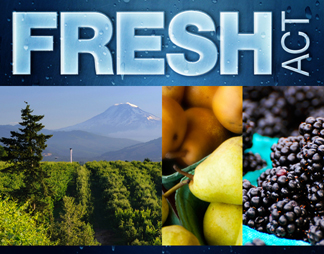
Wyden Introduces FRESH Act to Help Farmers and Improve Access to Healthier Foods
Legislation Would Also Help Small and Beginning Farmers
Washington, D.C. – Recognizing the need to improve programs that support farming and access to health food, Senator Ron Wyden today introduced the Fresh Regional Eating for Schools and Health Act (FRESH) to ensure that federal nutrition spending helps promote healthier eating and increases consumption of fruits and vegetables while helping local agriculture.
“As Congress prepares to write a new Farm Bill, I believe it is important that it provide healthier choices for recipients of federal programs, increase flexibility for state and local stakeholders, and provide better tools for small and beginning farmers,” Wyden said. “These improvements to the farm bill will improve the agriculture economy and give more people access to healthier and more nutritional food.”
Wyden rolled out the proposals at news conferences in Portland last Saturday and Medford on Sunday.
Key features of FRESH include encouraging states that find ways to get better nutritional outcomes for recipients of food stamps (now called SNAP - Supplemental Nutrition Access Program), allow schools to buy more fruits and vegetables from local farmers and create a “micro-loan” program to give farmers quicker access to capital.
Providing Flexibility for State Innovation in the SNAP Program: FRESH would allow states to apply for waives that encourage better nutritional outcomes for SNAP recipients. Currently, SNAP is a one-size-fits-all program that requires states to meet a strict process to get any sort of flexibility. There are many states that want to encourage healthier eating habits and improve health outcomes through the SNAP program. This waiver process would give states the flexibility to apply their own innovative ideas, such as encouraging healthy purchasing patterns and allow stores to provide incentives for SNAP recipients to purchase more healthy foods.
Allowing School Districts to Buy More Local and Regional Food: Currently, local school districts receive federal assistance to help pay for school lunches. hat means that Oregon schools are required to spend millions of dollars in federal assistance on commodity food products distributed through the USDA, with no idea where they are from. FRESH would allow schools to spend half of this money on locally and regionally produced agriculture. Schools would be given the flexibility to support local food economies while having the confidence of knowing where their food is coming from.
Small loans for family farms: USDA currently operates a loan program that allows farmers to receive loans of up to $300,000. However, many small farmers don’t need large loans when it comes to fixing equipment or buying animal feed. It would also expand eligibility for USDA operating loans to nonprofit groups, letting a local food bank get help for growing a small garden for food or buying refrigerators to store perishables.
Expanding Technology: Many food stands and farmers markets now accept credit and debit cards with a simple smart phone or tablet attachment. FRESH would require USDA to encourage and help states to implement the same technology for the cards that SNAP recipients use.
Eliminating barriers to new farm ownership loans: Under current law, new farmers must have three years of farm management experience to get direct loans from the Farm Services Agency to buy farm land. This bill would allow as an alternative the completion of college degrees related to business and agriculture, for example, degrees in Horticulture or Agricultural Business Management.
Suspending operating loan limits: During this protracted period of tight credit for farmers, particularly for new farmers and small to mid-sized farmers who want to expand, 15-year and seven-year limits on direct and guaranteed operating loans from FSA make little sense. The FSA operated without these time limits for 50 years, so there’s a clear precedent. Also, the time limits on FSA loans are routinely suspended. The 2002 and 2008 farm bills both suspended the limit for guaranteed operating loans temporarily. If as the credit market eases, farms appear to be getting over-leveraged, these time limits can be reinstated.
Additional Information at: http://wyden.senate.gov/freshact.
Next Article
